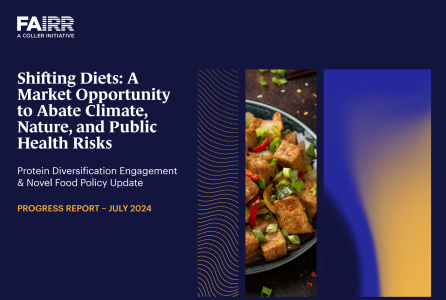Over the past year, FAIRR and a group of investors engaged 20 of the largest global food manufacturers and retailers to diversify protein portfolios in line with positive climate and nutrition outcomes.
Protein diversification offers companies, and also governments, with a viable method of shifting diets to be healthier and more sustainable.
For FAIRR’s full analysis and company findings from Phase 1, download the recent progress report.
Diet shifts are possible and often influenced by public and private institutions
In fact, consumers’ diets have been influenced primarily by governments for centuries, such as through rationing or the implementation of new trade deals.
Despite most European National Dietary Guidelines encouraging limitation of meat consumption, animal protein makes up an increasing proportion of diets. Historically, the excess consumption of animal protein in Western markets was influenced by the likes of state-backed milk advertisements, but even today, over 80% of payments under the European Union (EU) Common Agricultural Policy (CAP) support animal-sourced foods. With the global population expected to reach 8.5 billion by 2030, animal protein demand is projected to grow by a further 14%.
Companies have come to realise that shaping diets can provide them with a market advantage. Retailers especially have a key role to play in shifting diets through the products and price-points they offer. The cold-chain revolution of the 1960s for example, enabled UK retailers to drop the price of poultry by a third, having identified it as an alternative to red meat. Sales soared and chicken remains the most popular meat in Britain today.
Shifting diets in line with diversified protein portfolios offers a material opportunity, while abating climate, nature and health risks
In 2023/24, 66 investor signatories, with over USD $10.8 trillion in combined assets, supported FAIRR’s new Protein Diversification engagement. 85% of companies responded to investor letters and 75% of companies engaged in a dialogue with FAIRR members.
FAIRR’s engagement asks companies to:
Support the transition to a planetary health diet through the integration of protein diversification into climate strategies
Allocate resources to diversify their protein portfolio and improve nutrition and sustainability attributes
Engage consumers to promote the uptake of nutritious and sustainable alternative protein sources
Companies are exploring protein diversification as a market opportunity:
80% of companies recognise that they have a responsibility to drive consumer demand for sustainable and healthy products
95% of companies are investing resources to expand their plant-based portfolios
Companies are attracting more mainstream consumers by leveraging marketing strategies and increasing consumer satisfaction through healthier, whole food ingredients and product innovation
However, companies still overlook protein diversification as a decarbonisation tool:
80% of companies have not yet quantified the carbon mitigation potential of protein diversification, despite, on average, 26% of Scope 3 emissions being linked to animal agriculture supply chains
Only 25% of companies have set quantitative, timebound targets to increase plant-based product sales
95% of companies overlook the impact of protein diversification and diet shift on supply chains when transition planning for suppliers
Food retailers and manufacturers could increase their ambition with higher board level support for integration of protein diversification into their climate plans (currently 45% of companies) and sales targets (currently 25% of companies). Concurrently, it is likely that direction from regulators to reduce emissions will increase the pressure to decarbonise animal protein supply chains and diversify protein sources.
Aligned policy action is needed to shift to healthier, more sustainable diets at scale
Governments have taken a cautious approach to protein diversification so far, leaving uptake to the market. However, the financial burden of the excess consumption of animal proteins, predominantly in Western diets, on public health and climate risks is now too high to neglect protein diversification as a lever. In 2018, in Brazil, 8.4% of direct healthcare costs were attributed to the consumption of red and processed meat, and the following year, the beef industry caused losses to the domestic economy equivalent to 15% of the country’s GDP through deforestation.
Business as usual is no longer an option for companies, as FAIRR’s Climate Risk Tool shows that half of the major meat and dairy firms could face climate losses totaling $24 billion by 2030.
Some governments have taken action already, such as Denmark with its world-leading ‘National Action Plan to Promote Plant-based Foods’ and carbon tax on meat.
Novel technologies can further assist the uptake of sustainable proteins, if they increase consumer satisfaction through product performance (i.e. taste, texture, functionality). Public investment into alternative proteins increased in 2023, bringing all-time government funding to over $1.6 billion. Canada, the European Union (EU) and Denmark led the way in this charge to support research, development and commercialisation. However, politicisation and concerns over genetically modified organisms (GMOs) have led certain legislators to implement stringent regulations.
The climate risks associated with animal protein supply chains are too urgent to neglect protein diversification as a decarbonisation tool any longer. In order to meet the Paris Agreement targets, companies and governments must adopt a dual-approach, that includes supply chain interventions focused on regeneration and conservation, together with demand-side interventions that encourage more diverse, healthier and sustainable consumption patterns.
Both the World Health Organisation (WHO) and International Panel on Climate Change (IPCC) find that, alongside other measures, the adoption of healthier, more plant-based diets is a vital lever to stay within key planetary boundaries. Investors recognise this opportunity and continue to encourage further action through FAIRR’s Protein Diversification engagement with companies.
For FAIRR’s full novel food policy update, download the recent progress report.
Phase 2 of FAIRR’s Protein Diversification engagement will launch in Autumn 2024 to track company progress.
FAIRR insights are written by FAIRR team members and occasionally co-authored with guest contributors. The authors write in their individual capacity and do not necessarily represent the FAIRR view.













